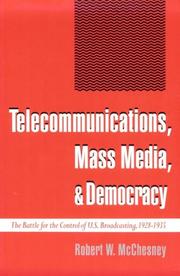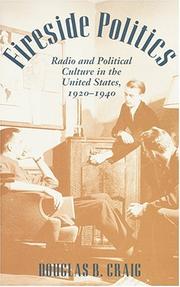| Listing 1 - 7 of 7 |
Sort by
|
Book
ISBN: 1621005402 Year: 2012 Publisher: New York, [New York] : Nova Science Publishers, Inc.,
Abstract | Keywords | Export | Availability | Bookmark
 Loading...
Loading...Choose an application
- Reference Manager
- EndNote
- RefWorks (Direct export to RefWorks)
Copyright --- Radio broadcasting policy --- Radio --- Performing rights --- Broadcasting rights --- Royalties --- Sound recordings --- Law and legislation
Book
ISBN: 1280697245 9786613674203 0809386747 1441645667 9781441645661 9780809386741 0809329190 9780809329199 9780809386741 9781280697241 6613674206 Year: 2009 Publisher: Carbondale Southern Illinois University Press
Abstract | Keywords | Export | Availability | Bookmark
 Loading...
Loading...Choose an application
- Reference Manager
- EndNote
- RefWorks (Direct export to RefWorks)
Radio broadcasting policy --- Radio broadcasting --- History --- Social aspects --- NBC Advisory Council.

ISBN: 1423740629 0195357531 1602560242 9781423740629 9780195093940 0195093941 9780195071740 0195071743 1280442034 9781280442032 9786610442034 6610442037 019802360X 0197726356 Year: 1993 Publisher: New York ; Oxford : Oxford University Press,
Abstract | Keywords | Export | Availability | Bookmark
 Loading...
Loading...Choose an application
- Reference Manager
- EndNote
- RefWorks (Direct export to RefWorks)
This study examines a critical point in US broadcasting, when a strong opposition emerged to challenge network-dominated, advertising-supported media such as radio.
Radio broadcasting policy --- Radio broadcasting --- Radio broadcasting and state --- Broadcasting policy --- History. --- Government policy --- Broadcasting --- Mass media --- #KVHA:Media --- #KVHA:Journalistiek --- #KVHA:Democratie; radio Verenigde Staten --- Broadcasting industry --- Communication and traffic --- Cultural industries --- Telecommunication --- Political aspects --- History --- Radio broadcasting policy.

ISBN: 0801875129 9780801875120 0801864399 9780801864391 0801883121 9780801883125 Year: 2000 Publisher: Baltimore Johns Hopkins University Press
Abstract | Keywords | Export | Availability | Bookmark
 Loading...
Loading...Choose an application
- Reference Manager
- EndNote
- RefWorks (Direct export to RefWorks)
Finally, he draws thoughtful comparisons of the American experience of radio broadcasting and political culture with those of Australia, Britain, and Canada.
Radio in politics --- Radio broadcasting policy --- Radio broadcasting --- Political broadcasting (Radio) --- Politics, Practical --- Radio broadcasting and state --- Broadcasting policy --- Radio --- Radio industry and trade --- Broadcasting --- Mass media --- History. --- Political aspects --- Government policy --- History --- E-books
Book
ISBN: 0803288743 0803288727 0803268440 0803286783 9780803288744 9780803268449 9780803286788 9780803288720 9780803288737 9780803288720 Year: 2016 Publisher: Lincoln
Abstract | Keywords | Export | Availability | Bookmark
 Loading...
Loading...Choose an application
- Reference Manager
- EndNote
- RefWorks (Direct export to RefWorks)
An exploration of the interplay of early radio technology and state power in Mexico, especially during the rule of Porfirio Díaz and the Mexican Revolution.
Radio in propaganda --- Radio broadcasting --- Radio broadcasting policy --- History. --- Political aspects --- Mexico --- Politics and government --- Radio broadcasting and state --- Radio --- Radio industry and trade --- Propaganda and radio --- Propaganda in radio --- Radio and propaganda --- Government policy --- Broadcasting --- Propaganda --- Broadcasting policy --- Freedom of information --- Government publicity --- Mass media
Book
ISBN: 0773599819 0773599800 9780773548091 0773548092 9780773548107 0773548106 9780773599819 9780773599802 Year: 2016 Publisher: Montreal [Quebećbec]
Abstract | Keywords | Export | Availability | Bookmark
 Loading...
Loading...Choose an application
- Reference Manager
- EndNote
- RefWorks (Direct export to RefWorks)
Before screens could be stared at, listeners lent their ears to radio, and Canadian listeners were as avid as any. In Canada before Television, Len Kuffert takes us back to the earliest days of broadcasting, paying particular attention to how programs were imagined and made, loved and hated, regulated and tolerated. At a time when democracy stood out as a foundational value in the West, Canada’s private stations and the CBC often had conflicting ideas about what should or could be broadcast. While historians have documented the nationalist and culturally aspirational motives of some broadcasters, the story behind the production of programs for both broad and specialized audiences has not been as effectively told. By interweaving archival evidence with insights drawn from secondary literature, Canada before Television offers perspectives on radio’s intimate power, the promise and challenge of US programming and British influences, the regulation of taste on the air, shifting and varied musical appetites, and the difficulties of knowing what listeners wanted. While this mixed system divided Canadians then and now, the presence of more than one vision for the emerging medium made the early years of broadcasting in Canada more culturally democratic for listeners who stood a better chance of getting both what they already liked and what they might come to like. Canada before Television offers an insightful look at the place of radio and debates about programming in the development of a cultural democracy.
Radio broadcasting --- Radio broadcasting policy --- Radio broadcasting and state --- Broadcasting policy --- Radio --- Radio industry and trade --- Broadcasting --- Mass media --- History. --- Social aspects --- Government policy --- Public radio --- Radio audiences --- Radio programs --- Programs, Radio --- Radio shows --- Shows, Radio --- Radio scripts --- Audiences, Radio --- Radio listeners --- Audiences --- Non-commercial radio --- Noncommercial radio --- Public broadcasting --- Public service radio programs --- History --- Rating&delete& --- Rating --- E-books
Book
ISBN: 0262320495 0262028123 1322317852 9780262320498 9780262320504 0262320509 9780262028127 Year: 2014 Publisher: Cambridge, Massachusetts
Abstract | Keywords | Export | Availability | Bookmark
 Loading...
Loading...Choose an application
- Reference Manager
- EndNote
- RefWorks (Direct export to RefWorks)
The US ushered in a new era of small-scale broadcasting in 2000 when it began issuing low-power FM (LPFM) licenses for noncommercial radio stations around the country. Over the next decade, several hundred of these newly created low-wattage stations took to the airwaves. This book describes the practices of an activist organisation focused on LPFM during this era. Despite its origins as a pirate broadcasting collective, the group eventually shifted toward building and expanding regulatory access to new, licensed stations.
TECHNOLOGY & ENGINEERING --- History --- Low power radio --- Community radio --- Alternative radio broadcasting --- Radio broadcasting --- Radio broadcasting policy --- Pirate radio broadcasting --- Journalism & Communications --- Radio & TV Broadcasting --- Political aspects --- Citizen participation --- Citizen participation. --- Offshore commercial radio --- Offshore radio broadcasting --- Radio pirates --- Radio stations --- Radio broadcasting and state --- Broadcasting policy --- Radio --- Radio industry and trade --- Broadcasting --- Freedom of information --- Government publicity --- Mass media --- Alternative commercial radio --- Countercultural commercial radio --- Countercultural radio broadcasting --- Freeform radio broadcasting --- Progressive radio broadcasting --- Underground radio broadcasting --- Association radio --- Community-access radio --- Free radio --- Local mass media --- Ethnic radio broadcasting --- Low power FM radio --- LPFM radio --- Low voltage systems --- Government policy --- E-books
| Listing 1 - 7 of 7 |
Sort by
|

 Search
Search Feedback
Feedback About UniCat
About UniCat  Help
Help News
News